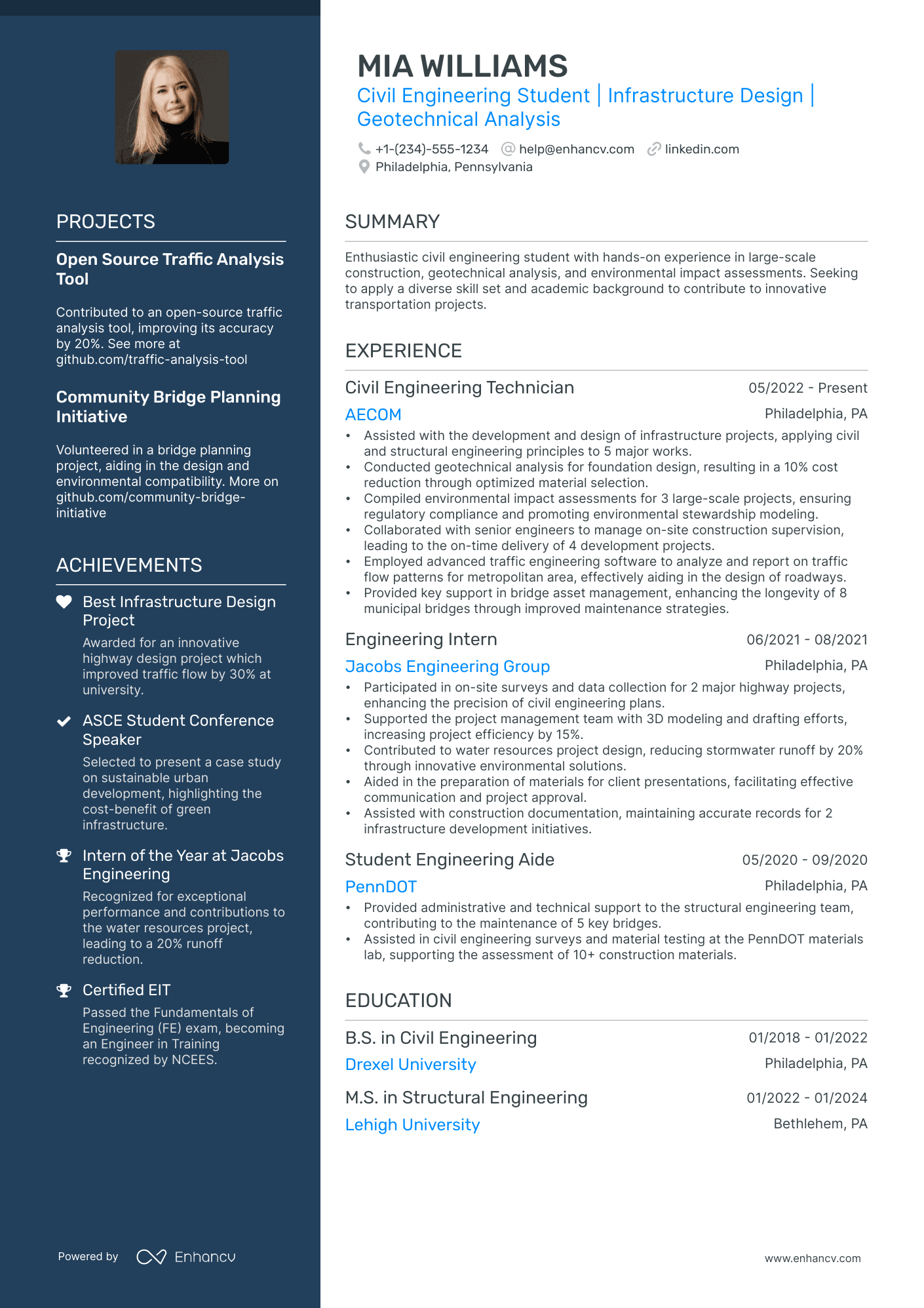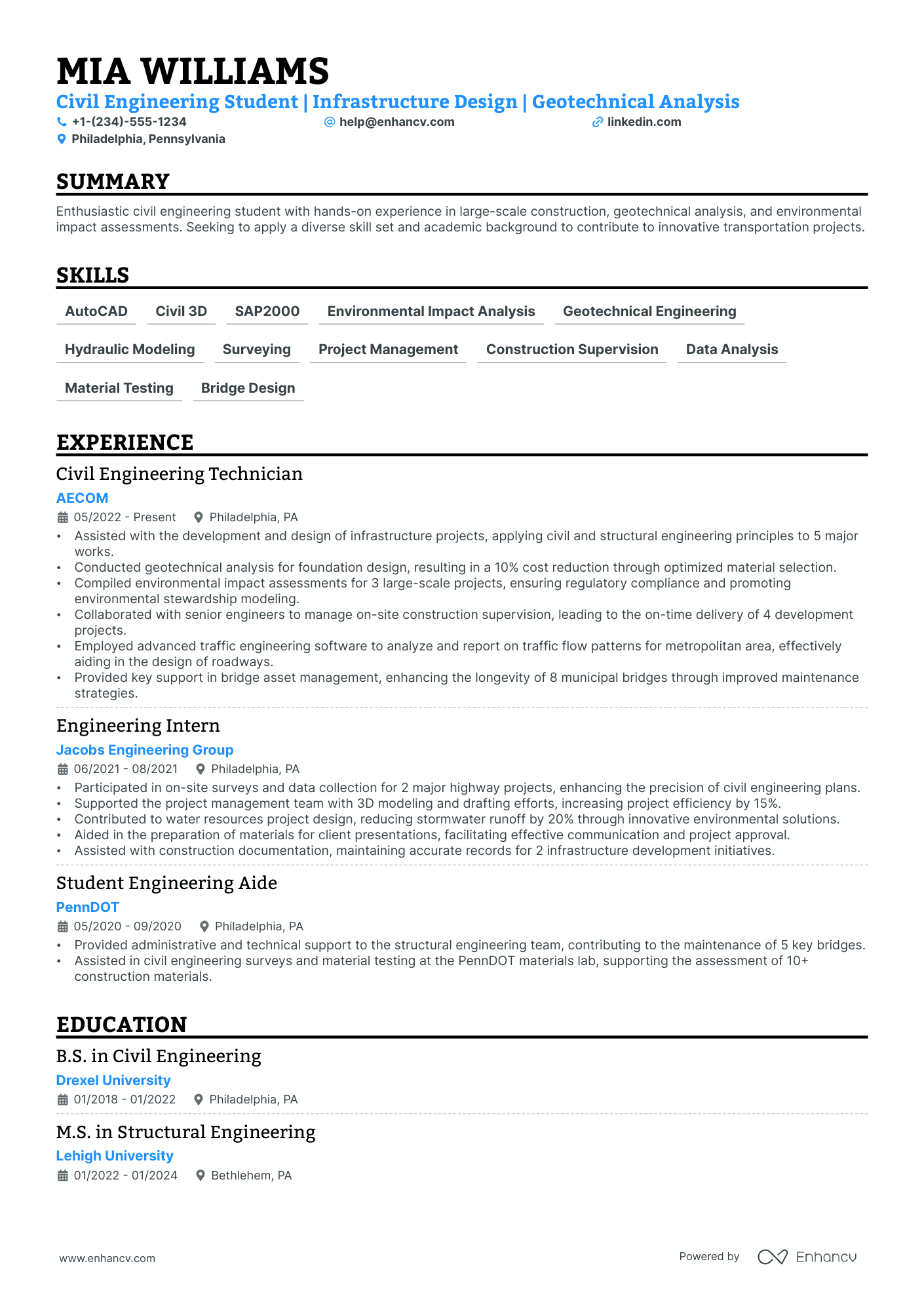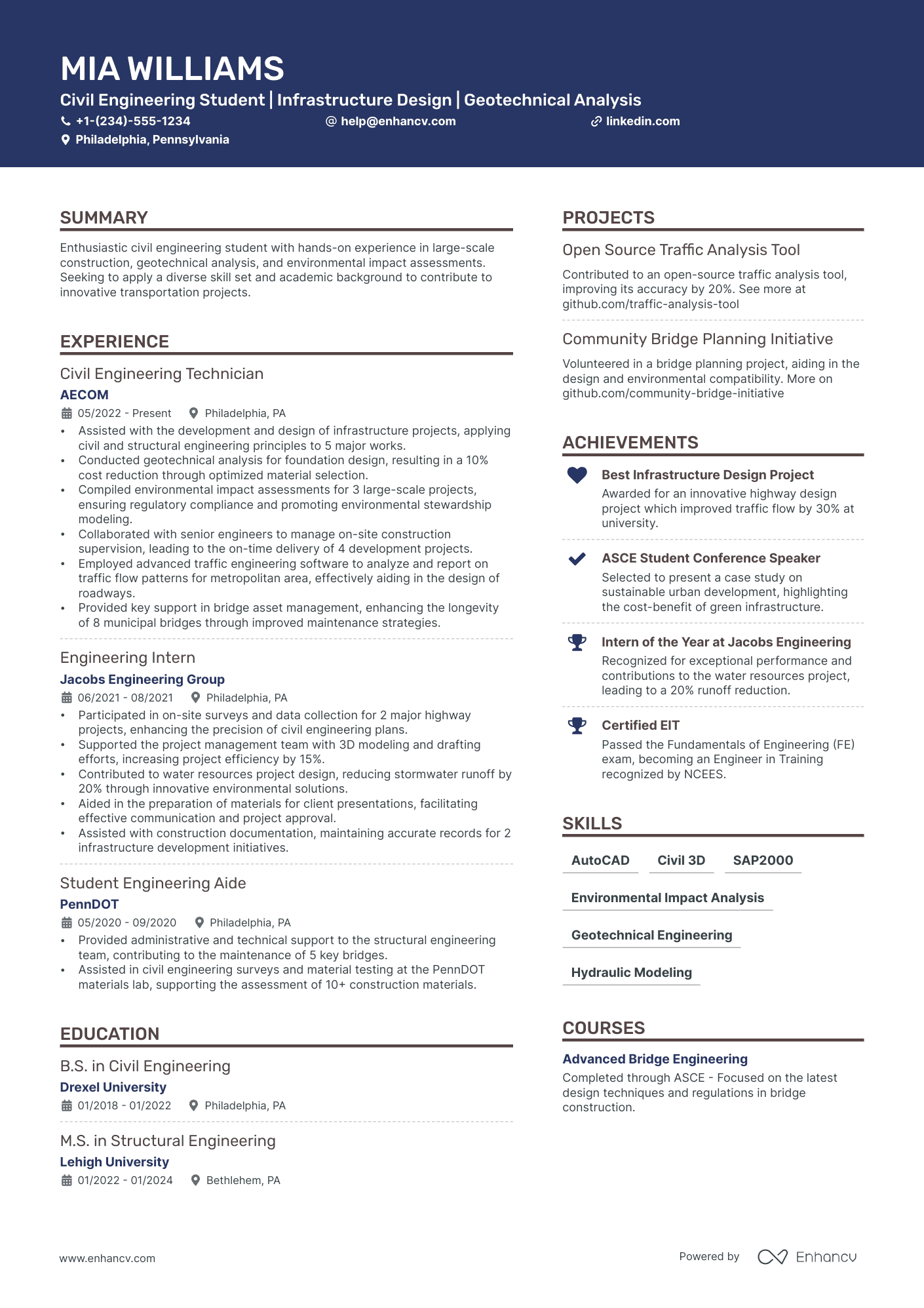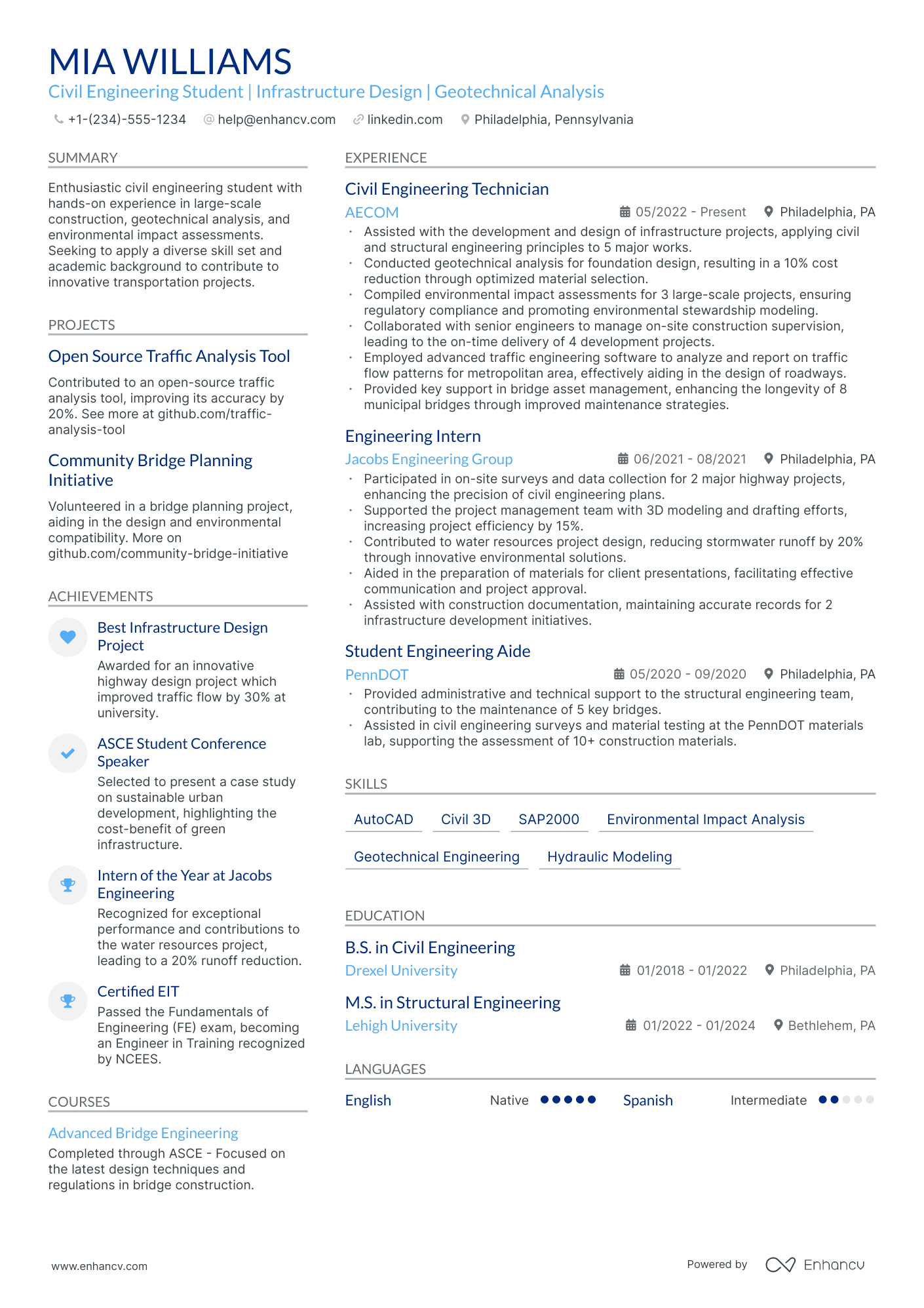As an engineering student, you might struggle to showcase relevant experience amidst academic projects and limited work history. Our guide will help you highlight your technical skills and academic achievements to construct a compelling narrative that resonates with engineering employers.
- Apply best practices from professional resumes to spotlight your application;
- Quantify your professional experience with achievements, career highlights, projects, and more;
- Write an eye-catching engineering student resume top one-third with your header, summary/objective, and skills section;
- Fill in the gaps of your experience with extracurricular, education, and more vital resume sections.
We've selected, especially for you, some of our most relevant engineering student resume guides. Getting you from thinking about your next career move to landing your dream job.
- Developer Resume Example
- ETL Developer Resume Example
- QA Tester Resume Example
- IT Infrastructure Manager Resume Example
- QA Analyst Resume Example
- Computer Engineer Resume Example
- Web Project Manager Resume Example
- IT Infrastructure Project Manager Resume Example
- IT Support Analyst Resume Example
- Security Director Resume Example
Designing Your Engineering Student Resume Format to Catch Recruiters' Eyes
Your engineering student resume will be assessed on a couple of criteria, one of which is the actual presentation.
Is your resume legible and organized? Does it follow a smooth flow?
Or have you presented recruiters with a chaotic document that includes everything you've ever done in your career?
Unless specified otherwise, there are four best practices to help maintain your resume format consistency.
- The top one third of your engineering student resume should definitely include a header, so that recruiters can easily contact you and scan your professional portfolio (or LinkedIn profile).
- Within the experience section, list your most recent (and relevant) role first, followed up with the rest of your career history in a reverse-chronological resume format .
- Always submit your resume as a PDF file to sustain its layout. There are some rare exceptions where companies may ask you to forward your resume in Word or another format.
- If you are applying for a more senior role and have over a decade of applicable work experience (that will impress recruiters), then your engineering student resume can be two pages long. Otherwise, your resume shouldn't be longer than a single page.
Different markets have specific resume styles – a Canadian resume, for instance, may require a different approach.
Upload & Check Your Resume
Drop your resume here or choose a file. PDF & DOCX only. Max 2MB file size.
PRO TIP
The more time and effort you've put into obtaining the relevant certificate, the closer to the top it should be listed. This is especially important for more senior roles and if the company you're applying for is more forward-facing.
The five (plus) definite sections your resume for a engineering student job should include are:
- Header with your headline, contact details, and/or a preview of your work
- Summary (or objective) to pinpoint how your success aligns with the role
- Experience with bullets of your most relevant achievements in the field
- Skills to integrate vital job requirements (both technical and personal)
- Your further dedication to the field, showcased via relevant higher education and/or certifications
What recruiters want to see on your resume:
- Relevant Technical Skills (e.g., CAD software, programming languages, simulation tools)
- Engineering Projects & Portfolio (e.g., capstone projects, personal projects, design challenges)
- Internship or Co-op Experience with engineering firms or relevant industry companies
- Certifications & Courses (e.g., EIT certification, specialized technical courses)
- Professional Engineering Organizations and Extracurricular Activities (e.g., ASME, IEEE memberships, engineering clubs, competitions)
Adding Your Relevant Experience to Your Engineering Student Resume
If you're looking for a way to show recruiters that your expertise is credible, look no further than the resume experience section.
Your engineering student resume experience can be best curated in a structured, bulleted list detailing the particulars of your career:
- Always integrate metrics of success - what did you actually achieve in the role?
- Scan the engineering student advert for your dream role in search of keywords in the job requirements - feature those all through your past/current experience;
- Dedicate a bullet (or two) to spotlight your technical capabilities and how you're able to use the particular software/technology in your day-to-day roles;
- Write simple by including your responsibility, a job advert keyword or skill, and a tangible outcome of your success;
- Use the experience section to also define the unique value of working with you in the form of soft skills, relevant feedback, and the company culture you best thrive in.
Industry leaders always ensure that their resume experience section offers an enticing glimpse at their expertise, while telling a career narrative. Explore these sample engineering student resumes on how to best create your resume experience section.
- Assisted in developing a new algorithm for optimizing workflow in the manufacturing process that increased output by 15%.
- Conducted extensive research on material properties leading to a 10% reduction in costs for material sourcing.
- Collaborated with senior engineers on the design of a hybrid hydraulic system which ultimately boosted system efficiency by 20%.
- Oversaw a team of student engineers in the prototype creation of an IoT-based energy monitoring system, targeting a 30% decrease in energy waste.
- Managed the integration of renewable energy sources into existing power grids while maintaining a 99.8% system reliability rate.
- Facilitated the transition from 2D to 3D CAD modeling, enhancing the precision of engineering drawings and reducing errors by 25%.
- Participated in the assembly and testing of unmanned aerial vehicles, achieving a reduction in testing time by 40% through process refinement.
- Authored a comprehensive report on potential improvements to propulsion systems that was later adopted to enhance engine performance by 10%.
- Implemented a set of quality control measures for component manufacturing that resulted in a 60% reduction in defects.
- Conducted advanced materials research, isolating a novel composite with 35% higher tensile strength, ripe for commercial application.
- Participated in patenting a unique structural design for high-rise buildings with improved earthquake resilience by 20%.
- Led a cross-functional team in the development of a solar-powered water purification unit, aiming for an increase of 50% in water processing efficiency.
- Engaged in the process of retrofitting industrial machinery, which extended machinery lifespan by an average of 5 years.
- Contributed to the engineering team by conducting stress analysis using FEA software, enhancing design integrity and safety.
- Supported quality assurance through meticulous defect tracking, which led to a 40% improvement in product reliability.
- Initiated a waste reduction program in production lines that cut down waste by 50,000 pounds annually.
- Developed a predictive maintenance schedule for key equipment, diminishing downtimes by 30% and increasing productivity.
- Streamlined the assembly process by incorporating lean manufacturing principles, leading to a 15% improvement in assembly time.
- Enhanced the design of hydraulic systems for construction equipment, increasing load handling capacity by 10%.
- Compiled a database of material suppliers, optimizing the procurement process and achieving a 20% reduction in lead times.
- Designed custom tools for special engineering projects which improved the overall efficiency and reduced labor costs by 15%.
- Developed a prototype for an autonomous delivery vehicle, enhancing last-mile delivery efficiency by 25%.
- Employed data analytics to optimize supply chain logistics, leading to 5% savings in transportation costs.
- Executed material testing procedures that verified product compliance with international standards, mitigating risk of regulatory penalties.
- Assisted in the development and validation of a mobile app for industrial machine monitoring, boosting user engagement by 200%.
- Collaborated with software engineers to improve the firmware of smart sensors, achieving 30% faster data transmission rates.
- Played a pivotal role in a team that designed a more efficient air filtration system for HVAC units, projected to improve air quality by 40%.
- Completed a comprehensive analysis on the impact of varying wing designs on aircraft performance, influencing future design considerations.
- Conducted wind tunnel experiments that provided critical data for optimizing aerodynamic profiles, aiming at reducing drag by 15%.
- Contributed to a research team working on nanomaterials, potentially revolutionizing material science with applications in aeronautics.
Quantifying impact on your resume
- Include the exact number of projects you've worked on to demonstrate concrete experience.
- Specify the percentage of efficiency improvement your solutions provided to communicate problem-solving abilities.
- List the sizes of teams you've led or collaborated with to illustrate leadership and teamwork skills.
- State the amount of funding secured for projects to highlight your ability to acquire resources.
- Quantify the scale of the systems or structure you’ve developed or improved upon to show technical competence.
- Indicate the number of technical reports or documents you've authored to demonstrate communication and analytical skills.
- Mention the amount of time you've reduced from processes due to optimizations you've implemented to showcase efficiency.
- Describe the scale of models or simulations performed, using relevant numbers, to reflect your hands-on experience.
Action verbs for your engineering student resume
How to shift the focus from your engineering student resume experience section to your professional profile
If you're at the start of your career journey or transitioning industries, you might be concerned about the lack of professional experience while crafting your engineering student resume.
How can you effectively present your engineering student resume experience section under these circumstances?
Rather than a traditional, extensive experience section, demonstrate your expertise through:
- Emphasizing your education. Your academic background might impress recruiters, especially if it includes recent, industry-relevant knowledge;
- Creating a compelling objective statement. The first few sentences of your resume should map out your motivations and career aspirations, offering insight into your goals;
- Highlighting your transferable skills. For example, if you've honed communication skills through volunteering, illustrate on your engineering student resume how these can benefit a potential employer;
- Detailing your technical background in certifications and skills sections. As a recent graduate, your technological foundations might be particularly attractive to employers looking to develop these skills further.
It's important to remember that employers sometimes prefer candidates with less experience but who are a better cultural fit for their organization.
Recommended reads:
PRO TIP
Showcase any ongoing or recent educational efforts to stay updated in your field.
How to Showcase Hard Skills and Soft Skills on Your Resume
Reading between the lines of your dream job, you find recruiters are looking for candidates who have specific software or hardware knowledge, and personal skills.
Any technology you're adept at shows your hard skills. This particular skill set answers initial job requirements, hinting at how much time your potential employers would have to invest in training you. Showcase you have the relevant technical background in your communicate, solve problems, and adapt to new environments. Basically, your interpersonal communication skills that show recruiters if you'd fit into the team and company culture. You could use the achievements section to tie in your greatest wins with relevant soft skills.
It's also a good idea to add some of your hard and soft skills across different resume sections (e.g. summary/objective, experience, etc.) to match the job requirements and pass the initial screening process. Remember to always check your skill spelling and ensure that you've copy-pasted the name of the desired skills from the job advert as is.
Top skills for your engineering student resume:
MATLAB
AutoCAD
SolidWorks
C++
Python
LabVIEW
Catia
Simulink
ANSYS
Excel
Problem Solving
Teamwork
Communication
Time Management
Critical Thinking
Adaptability
Attention to Detail
Creativity
Leadership
Work Ethic
PRO TIP
List your educational qualifications and certifications in reverse chronological order.
Certifications and Education: In-demand Sections for Your Engineering Student Resume
Your academic background in the form of certifications on your resume and your higher degree education is important to your application.
The certifications and education sections pinpoint a variety of hard and soft skills you possess, as well as your dedication to the industry.
Add relevant certificates to your engineering student resume by:
- Add special achievements or recognitions you've received during your education or certification, only if they're really noteworthy and/or applicable to the role
- Be concise - don't list every and any certificate you've obtained through your career, but instead, select the ones that would be most impressive to the role
- Include the name of the certificate or degree, institution, graduation dates, and certificate license numbers (if possible)
- Organize your education in reverse chronological format, starting with the latest degree you have that's most applicable for the role
Think of the education and certification sections as the further credibility your engineering student resume needs to pinpoint your success.
Now, if you're stuck on these resume sections, we've curated a list of the most popular technical certificates across the industry.
Have a look, below:
The top 5 certifications for your engineering student resume:
- Engineer in Training (EIT) - National Council of Examiners for Engineering and Surveying (NCEES)
- Certified SolidWorks Associate (CSWA) - Dassault Systèmes
- Occupational Safety and Health Administration Certification (OSHA) - Occupational Safety and Health Administration
- Project Management Professional (PMP) - Project Management Institute (PMI)
- Autodesk Certified Professional (ACP) - Autodesk
PRO TIP
The more trusted the organization you've attained your certificate (or degree) from, the more credible your skill set would be.
Recommended reads:
The Engineering Student Resume Summary Or Objective: Integrating Keywords, Achievements, and More
Deciding whether to include a resume summary or an objective in your engineering student resume is crucial. Both serve as key introductory elements at the top of your resume, encapsulating your profile in up to five sentences and incorporating relevant keywords from the job advert.
Here are the key differences between the two:
- The resume summary focuses on aligning your achievements and experience with the job requirements. It provides recruiters with a snapshot of your expertise, helping you stand out as an ideal candidate for the role.
- The resume objective, on the other hand, centers on your career goals and aspirations, detailing how the role aligns with your career progression. It's particularly suitable for candidates with less professional experience or those new to the job market.
Below are examples demonstrating best practices in utilizing the resume summary and/or objective to make a strong first impression with your engineering student resume.
Resume summaries for a engineering student job
- With over 3 years of experience in mechanical engineering and a proven track record of designing efficient thermal systems, I bring to the table advanced proficiency in SolidWorks and ANSYS. Garnering the 'Best Innovation' award at the Annual Tech Conference for my patent-pending heat exchanger design signifies my commitment to cutting-edge solutions.
- As a computer science professional pivoting into electrical engineering, I leverage over 5 years of algorithm design and robust coding skills to address complex circuitry challenges. I have a successful record of creating AI models that optimize energy consumption, reflecting my adaptability and passion for sustainable engineering practices.
- Dedicated civil engineering graduate aiming to apply my knowledge of geotechnical materials and AutoCAD drafting acquired through a rigorous internship at a leading infrastructure development firm. Eager to contribute to high-impact projects, with a focus on safety and environmental standards, as I start my professional engineering journey.
- Holding over 4 years of experience in finance, I'm transitioning into the field of industrial engineering, drawing on strong analytical skills and expertise in process optimization. My notable achievement includes developing a cost-saving plan that cut operational expenses by 20% year-over-year, demonstrating my potential for increasing efficiency in production systems.
- Keen to apply the theoretical knowledge and problem-solving skills acquired from a B.S. in Mechanical Engineering to practical situations. My objective is to develop innovative solutions that enhance performance while minimizing environmental footprint, drawing inspiration from my senior project which improved the energy efficiency of HVAC systems.
- Enthusiastic about embarking on a new career path in chemical engineering, I am armed with a foundational understanding of chemical processes and laboratory techniques from my biochemistry background. Ready to translate my expertise in data analysis and precision lab work into optimizing chemical production processes.
Four More Sections for Your Engineering Student Resume
Your engineering student resume can be supplemented with other sections to highlight both your personality and efforts in the industry. Use the ones you deem most relevant to your experience (and the role):
- Awards - to celebrate your success;
- Interests - to detail what you're passionate about outside of work (e.g. music, literature, etc.);
- Publications - to show your footprint in the wider community;
- Projects - to pinpoint noteworthy achievements, potentially even outside of work.
Key Takeaways
- The format and layout of your engineering student resume should reflect on both your career and what matters most to the job you're applying for;
- Use the resume summary and objective to hint at your most prominent accomplishments;
- Always be specific about your experience and consider what value each bullet you curate adds to your engineering student application;
- Consider how your academic background and technical capabilities could further showcase your alignment to the role;
- Your soft skills should contribute to your overall engineering student profile - aligning your personality with skills and results.






